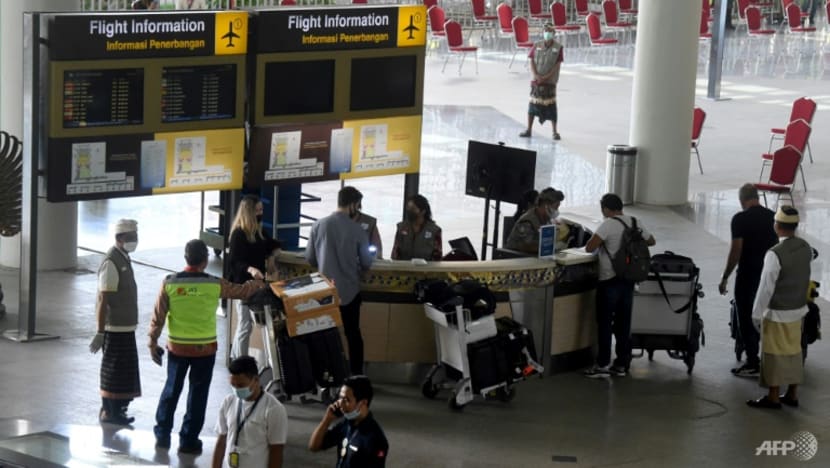Indonesia calls for ASEAN travel corridor to be expedited to accelerate regional economic recovery

Travellers walk through the international arrivals hall at Ngurah Rai International Airport in Bali. (Photo: AFP/Sonny Tumbelaka)
JAKARTA: Indonesia has said that the implementation of a travel corridor among members of the Association of Southeast Asia Nations (ASEAN) should be expedited to accelerate regional post-pandemic economic recovery.
Indonesian Foreign Minister Retno Marsudi said on Thursday (Feb 17) that the implementation of the ASEAN Travel Corridor Arrangement Framework (ATCAF) has been slow.
Speaking at a virtual press conference after the ASEAN Foreign Ministers Retreat in Cambodia’s capital Phnom Penh, Mdm Marsudi said that the ATCAF can be implemented through bilateral as well as comprehensive arrangements.
“For this reason, Indonesia encourages the acceleration of the ATCAF implementation, both through bilateral agreements as well as comprehensive openings with strict health protocols,” said Mdm Marsudi.
ASEAN has been discussing the ATCAF since 2020 which would allow people from the region to travel freely amid the COVID-19 pandemic.
Indonesia has so far opened Nongsapura in Batam and Lagoi in Bintan to vaccinated travellers from Singapore since late January which enable travellers to these areas without quarantine.
On Wednesday, Singapore announced that vaccinated travel lane (VTL) arrangements via sea from Batam and Bintan in Indonesia would be launched from Feb 25.
Indonesia and Malaysia had also announced back in November that both countries would start a travel corridor but details have yet been confirmed.
On Myanmar, Mdm Marsudi said that she and her ASEAN counterparts are concerned about the situation in the country and the lack of significant progress in implementing the Five-Point Consensus agreed with ASEAN in April last year.
ASEAN invited Myanmar to send a non-political representative to Thursday’s foreign ministers’ meeting but Myanmar’s junta had opted not to send a representative.
Myanmar has been in turmoil since the military ousted the civilian government last year, and at least 1,500 civilians have been killed in crackdowns on anti-junta protests.
“All ASEAN countries expect progress in the implementation of the Five-Point Consensus,” said Mdm Marsudi adding that the implementation is important for the people of Myanmar.
Mdm Marsudi also said that ASEAN foreign ministers had reiterated their position on the importance of peace and stability in the South China Sea by having a Code of Conduct that is substantive and effective, in line with the United Nations Convention on the Law of the Sea (UNCLOS).
ASEAN and China have been negotiating a regional code of conduct to solve disputes for several years but the COVID-19 pandemic has delayed talks further.
BOOKMARK THIS: Our comprehensive coverage of the COVID-19 pandemic and its developments
Download our app or subscribe to our Telegram channel for the latest updates on the coronavirus pandemic: https://cna.asia/telegram















